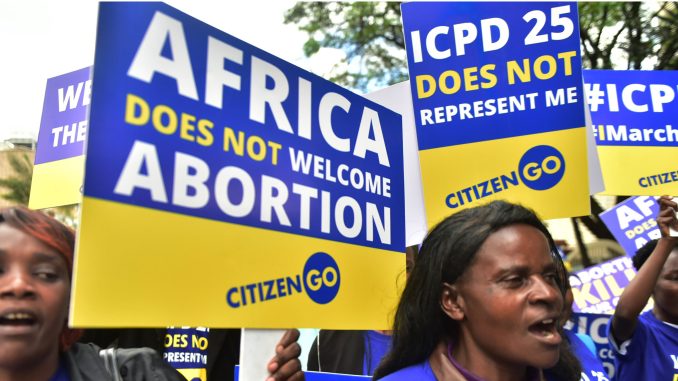
As we approach the first anniversary of the Dobbs v. Jackson Women’s Health Organization abortion ruling from the Supreme Court, which overturned Roe v. Wade, the battle for the protection of human life continues unabated around the world.
While here in the U.S. the fight to expand or limit abortion at the state-level rages on, pro-lifers should not ignore the immense pressure to codify a “human right” to abortion internationally.
Recently, that push was made evident when the Biden administration and other members of the Group of Seven (Canada, France, Germany, Italy, Japan, and the United Kingdom) nations advocated for the inclusion of “sexual and reproductive health and rights“—a frequently invoked euphemism for abortion—in addition to “safe and legal abortion and post-abortion care” as an essential part of “universal health coverage” in the G7 Hiroshima Leaders’ Communiqué.
The annual meeting telegraphs the G7 countries’ priorities in a variety of areas, including global security, economic policy, and human rights. Evidently, abortion is at the top of the list.
Next up, the United Nations is set to host a major deliberation on the same topic. U.N. member nations currently are preparing to undertake negotiations on a Political Declaration on Universal Health Coverage to be adopted at the 2023 General Assembly in September.
The Biden administration’s penchant for global abortion promotion will be on full display. Given the influence of a political declaration on government priorities the world over, it provides the perfect target for attempting to obtain a reference to abortion as a “human right,” thus bolstering the lie that the taking of unborn life is an international entitlement.
While it’s a laudable goal to improve access to health care, including abortion as a “necessary” service would contravene the sovereign right of states to nationally determine the health care considered “essential” in their countries.
The promotion of radical Western constructs undermines the diverse cultural, religious, and social backgrounds of different countries, many of which continue to accord the highest protections to unborn life.
As the aftermath of Dobbs unfolds domestically in the U.S., it’s clear that promoters of the abortion agenda have a renewed interest in eliding domestic setbacks by imposing their radical ideas at the international level.
Targeting international institutions is central to their campaign, given that if abortion were ever considered an international human right or otherwise “essential” as part of “universal health coverage,” it would put immense pressure on all countries to overturn laws protecting human life.
Such efforts are not only anti-democratic, but also legally baseless.
Indeed, an honest reading of the text of foundational international human rights treaties shows that there is no basis for a supposed international “human right” to abortion. One need only look to documents such as the International Covenant on Civil and Political Rights, which recognizes that “every human being” has the inherent right to life (Art. 6.1) and prohibits states from carrying out the death penalty on pregnant women (Art. 6.4).
As the working documents surrounding the creation of the treaty make clear, the principal reason for providing that paragraph “was to save the life of an innocent unborn child.”
Likewise, the International Covenant on Economic, Social and Cultural Rights of 1966 states that “all children and young persons” are to be accorded special measures of protection and assistance (Art. 10.3).
Finally, the Convention on the Rights of the Child of 1989-’90 acknowledges: “the child, by reason of his physical and mental immaturity, needs special safeguards and care, including appropriate legal protection, before [emphasis added] as well as after birth.” (Preamble)
The insistence of the Biden administration and its ideological allies to conjure up a faux international human right to abortion relies on willing accomplices at the international institutions, working together to push an “evolutionary interpretation” of international law.
While the pressure on developing countries is immense, so is the backlash against this insidious agenda. Many countries have been fighting back in recent years and reiterated their sovereign prerogative to protect human life and dignity, including by forming pro-life coalitions, such as the Geneva Consensus Declaration in October 2020.
Rather than pushing for more abortions everywhere, what the leaders of the G7 should commit to is assisting governments in areas of health care that truly affirm human life. Many developing states would benefit from authentic forms of assistance, such as financing for medical infrastructure, hospitals and clinics, training for nurses and doctors, addressing the “brain drain” of medical personnel, beneficial terms in technology transfer, and technical assistance to improve hygiene and sanitation.
Those are just some of the areas that were most heavily affected during the COVID-19 pandemic, and where real help could make a difference.
In turn, the United States and other G7 member states, who are facing demographic deficits, plunging birthrates, and Social Security and pension shortfalls, would have much to learn from countries that are enacting policies to support the family, maternity, and childbirth.
While it remains to be seen how U.N. negotiations will proceed in the months ahead, we can hope governments increasingly resolve to defend against the immense threats to their sovereignty and to their very ability to defend the lives of their most vulnerable.
The Daily Signal publishes a variety of perspectives. Nothing written here is to be construed as representing the views of The Heritage Foundation.
Have an opinion about this article? To sound off, please email letters@DailySignal.com and we’ll consider publishing your edited remarks in our regular “We Hear You” feature. Remember to include the url or headline of the article plus your name and town and/or state.

